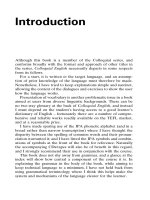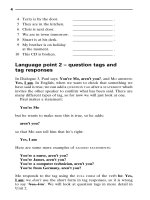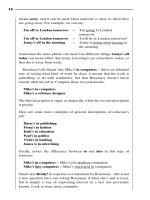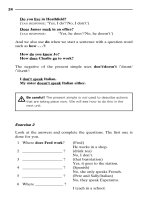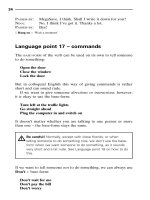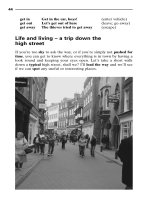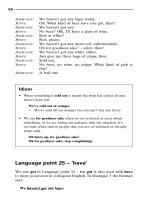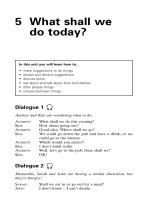Tài liệu A complete English language course part 13 pptx
Bạn đang xem bản rút gọn của tài liệu. Xem và tải ngay bản đầy đủ của tài liệu tại đây (240.42 KB, 10 trang )
Dialogue 3
Hannah and Simon are planning a picnic with Abigail and Gary, but
Hannah’s a bit worried about the weather.
H
ANNAH
: Will it rain later, do you think?
S
IMON
:[looks in the paper] The forecast says it’ll be sunny till
lunchtime.
H
ANNAH
: What about this afternoon?
S
IMON
:[looks in the paper again] Clouds and wind will come
in from the west.
H
ANNAH
: So it won’t rain today, then?
S
IMON
: I don’t think so – but it’ll be chilly for a picnic.
H
ANNAH
: Let’s put it off till tomorrow, shall we?
S
IMON
: OK. Will you phone Abigail and Gary to let them
know?
H
ANNAH
: I’ll do that right now.
104
Morning Afternoon
Language point 43 – ‘will’ future
There are a number of ways of talking about the
FUTURE
in English.
In Language point 37 we used the
PRESENT SIMPLE
after words like
when, and in Language point 41 we saw two more ways: the
PRESENT
CONTINUOUS
and be going to.
We can also talk about the future using the
AUXILIARY
will +
BASE
-
FORM
of the verb. This auxiliary (as with most auxiliaries in English)
doesn’t change for different persons:
I will
you will
he will not ‘he wills
’
In colloquial English will is usually shortened to ’ll, and there are
the following pronunciations, which you should learn:
I’ll /ɑil/ we’ll /wil/
you’ll /jul/ they’ll /ðεil/
he’ll /hil/ Peter’ll /`pitərəl/
she’ll /ʃil/ Jane’ll /`
εinəl/
But in questions we always use the full form will, not ’ll:
Will it rain? not ‘’ll it rain?
’
and we always use the full form in tags:
Yes, it will not ‘Yes, it’ll
’
As with all auxiliaries, we form the negative by adding not – but in
colloquial English we have a special short form for will not: won’t
/wəυnt/.
We use the will-future in two main situations:
(1) to talk about things we know or expect will happen:
The next train will leave
at eight o’clock
China will win
the international swimming competition
The children will enjoy
the trip to the cinema
1111
2
3
4
5
6
7
8
9
10
11
1211
13
14
15
16
17
18
19
20
21
22
23
24
25
26
27
28
29
30
31
32
33
34
35
36
37
38
39
40
41
4211
105
(2) to express intention to do something in the near future:
I’ll phone
you at about six
We’ll book
the tickets today
I’ll go
upstairs and tell James
We also use will in the phrase Will you . . .? +
BASE
-
FORM
:
Will you phone Dave and Pete?
When Alex says this, she is not asking about the future – she’s
making a request (asking someone to do something). This is the
normal way of making requests in English – here are some more
examples:
Will you open the door for me?
Will you help me with my homework?
Will you check the oil in the car, please?
And we use won’t when we refuse to do something:
I won’t help
him because I don’t like him
Exercise 4
Rewrite these future sentences using going to or will/won’t – the
first one has been done for you.
1 I’ll phone him tomorrow. I’m going to phone him
tomorrow.
2 Is Amanda going to stay
here? ________________________ ?
3 They’re not going to wait
for us. ________________________ .
4 Will Dave be here tomorrow? ________________________ ?
5 We’ll show you the sights. ________________________ .
6 The weather is going to get
better. ________________________ .
7 James won’t forget, will he? ____________, __________ ?
8 I won’t do my homework yet. ________________________ .
9 Suzie isn’t going to be there. ________________________ .
10 Is Fred going to read that
book? ________________________ ?
106
Exercise 5
Correct the following sentences. Be careful – two of them don’t need
correcting.
1 Do you go to phone them?
2 Is Justine going to doing the shopping?
3 Are Kath going to buy the tickets?
4 We’re not going to meet them after all.
5 The trains go to be late all day today.
6 Does he going to be late again?
7 Do we going to be in time?
8 My brother’s going to do the cooking.
9 I’ll going to phone them tomorrow.
10 Be Henry going to wash the car?
Dialogue 4
James rings Dave to change plans.
J
AMES
: Hello Dave.
D
AVE
: James! How’s things?
J
AMES
: Fine. But listen, Dave – something’s come up, and I
have to visit my family in Scotland. But I know we
were going to get together tomorrow over lunch to
discuss business, weren’t we?
D
AVE
: Yes – do you want to put it off?
J
AMES
: Would you mind?
D
AVE
: No problem! How about later in the week?
J
AMES
: Would Thursday fit in with you?
D
AVE
: Thursday’s fine. I’ll put you down for twelve o’clock.
Language point 44 – more about
phrasal verbs
As we saw in Language point 20 in Unit 3,
PHRASAL VERBS
are an
important and common feature of colloquial English. And we have
to be careful when we use them with
PRONOUNS
.
In Dialogue 4 Dave says:
I’ll put you down for twelve o’clock
1111
2
3
4
5
6
7
8
9
10
11
1211
13
14
15
16
17
18
19
20
21
22
23
24
25
26
27
28
29
30
31
32
33
34
35
36
37
38
39
40
41
4211
107
and he puts the
OBJECT
pronoun you before the second part of the
phrasal verb. He doesn’t say:
‘I’ll put down you for twelve o’clock
’
When we use
PRONOUNS
as the objects of phrasal verbs, we must put
them between the verb and the adverb. More examples:
Please write
it down for me
not ‘Please write down it for me
’
The radio’s been on all day – why don’t you turn
it off?
not ‘why don’t you switch off it?
’
But with
NOUN
objects, we can put them either before or after the
adverb:
Why don’t you turn
the radio off?
or Why don’t you turn off
the radio?
I’ve got to pay
this cheque in.
or I’ve got to pay in
this cheque.
Exercise 6
Change these phrasal verb sentences by replacing the noun with a
pronoun, as in the first example.
1 I’m going to pay in this cheque. I’m going to pay it in.
2 Henry’s going to do up the
house. __________________ .
3 Could you turn off the radio? __________________ ?
4 I need to look up these words. __________________ .
5 Could you write down the
address? __________________ ?
6 Will you fill in these forms? __________________ ?
7 We’re going to send back the
letters. __________________ .
8 They’re going to knock down
this building. __________________ .
9 Tom’s trying to start up the
engine. __________________ .
10 Switch off the lights, please. __________________ .
108

